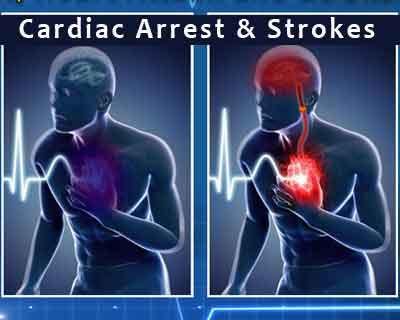- Home
- Editorial
- News
- Practice Guidelines
- Anesthesiology Guidelines
- Cancer Guidelines
- Cardiac Sciences Guidelines
- Critical Care Guidelines
- Dentistry Guidelines
- Dermatology Guidelines
- Diabetes and Endo Guidelines
- Diagnostics Guidelines
- ENT Guidelines
- Featured Practice Guidelines
- Gastroenterology Guidelines
- Geriatrics Guidelines
- Medicine Guidelines
- Nephrology Guidelines
- Neurosciences Guidelines
- Obs and Gynae Guidelines
- Ophthalmology Guidelines
- Orthopaedics Guidelines
- Paediatrics Guidelines
- Psychiatry Guidelines
- Pulmonology Guidelines
- Radiology Guidelines
- Surgery Guidelines
- Urology Guidelines
Smartphones can help save life during cardiac arrest, strokes

New York : Smartphone apps and other digital technology have the potential to provide rapid emergency care for cardiac arrest, heart attacks and strokes, says researchers.
Digital technology like mobile devices, social media, visual media and crowd sourcing could aid in swift reponse to the patient and thus, boost their survival odds.
"When seconds count, early recognition of the symptoms of cardiac arrest, heart attack or stroke and quick action can make a huge difference in whether someone lives or dies or has serious complications afterwards," said Raina Merchant from Penn Medicine Center for Health Care Innovation a US based health care organisation.
Smartphone apps to view brain images for stroke and Face Time videoconferencing apps to assess stroke patients by a remote neurologist may also be helpful.
"Digital platforms can support existing efforts to educate people about what to do in an emergency. Learning what to do including how to perform Cardiopulmonary resuscitation (CPR) and recognising the symptoms of stroke is something many people can do that can save lives," Merchant added.
However, inaccurate information being provided via digital tools could lead to medical errors costing lives, cautioned the authors.
For the study, published in the journal Circulation, the team reviewed scientific studies to evaluate current knowledge on the effectiveness of digital strategies at improving emergency cardiac and stroke care.
According to the researchers, some studies on digital strategies have shown positive results, such as a Swedish study that used a mobile phone application to alert volunteers within 500 meters of a cardiac arrest victim to respond and start CPR.
It found that 62 per cent of the volunteers with the app started CPR, while only 48 per cent of bystanders without the app started CPR.
A Japanese study found that when emergency department personnel sent pictures of 12-lead ECGs via their smartphone to interventional cardiologists for interpretation, the smartphone method shaved 1.5 minutes off the time clinicians needed to diagnose a patient, compared to sending the images via fax.

Disclaimer: This site is primarily intended for healthcare professionals. Any content/information on this website does not replace the advice of medical and/or health professionals and should not be construed as medical/diagnostic advice/endorsement or prescription. Use of this site is subject to our terms of use, privacy policy, advertisement policy. © 2020 Minerva Medical Treatment Pvt Ltd